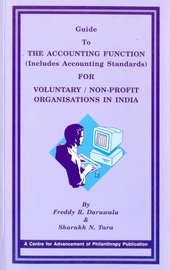|
Freddy R. Daruwala & Sharukh N. Tara, pp. 152, Rs. 100, Centre for Advancement of Philanthropy Publication The need for a handbook to understand the accounting function, especially with regard to voluntary/not-for-profit organizations in India, was felt for a long time. Keeping proper accounts is not only a statutory requirement under the various laws affecting voluntary organizations, but also a requisite for enhancing credibility in the eyes of all stakeholders. Financial reports can never give the complete picture of a voluntary organization's operations, effectiveness and accomplishments. However, if prepared accurately and truthfully, it can go a long way in achieving that goal.
Today, voluntary organizations are required to prepare financial statements for a diverse cross-section of stakeholders - donors, government agencies, governing boards and the public at large. The treasurer/financial controller/chief accountant of a voluntary organization generally assumes four important accounting responsibilities:
Fortunately, today, Information Technology offers voluntary organizations the cutting edge for improving efficiency and effectiveness of accounting and financial reporting. It is recommended that even small to medium size voluntary organizations should take advantage of available technology to ensure accurate and efficient operation of accounting and financial reporting systems. Modern accounting software allows the user to maintain transaction files from which all the month-end, year-to-date and year-end journals, ledgers, trial balances and other financial reports can be generated. These accounting programmes typically require the user to code transactions according to a chart of accounts - rather than posting or recording transactions in a separate journal or ledger for each account, as is done in manual bookkeeping. Typically, the software uses the coding to post transactions to the appropriate accounts. Most software programmes automatically double-code single transactions and thus automatically perform double-entry bookkeeping. The basic purpose of financial statements is to tell the "financial story" of the organization: how and for what purposes the resources were mobilized and spent? What efforts were exerted and what was accomplished with the resources? Users of these statements also need to know and assess the financial health of the organization. How financially viable is the organization? What is the likelihood of its financial sustainability? The authors, Freddy R. Daruwala and Sharukh N. Tara, deserve hearty congratulations for their effort in preparing this Guide in a style that is easy to comprehend. It is a valuable resource for all those involved with the financial accounting of voluntary organizations. Special thanks are due to Mr. R.R. Chari, Commissioner of Income Tax (Retd.), for his valuable guidance and input for this book. The Centre for Advancement of Philanthropy is dedicated to building capacity and enhancing the effectiveness of all philanthropic organizations in the country through its consultancy services, publications and training programmes. This Guide is yet another publication to assist voluntary/not-for-profit organizations understand the accounting function. The publication of this book has been possible thanks to a generous grant from the Ford Foundation. Noshir H. Dadrawala Executive Secretary Centre for Advancement of Philanthropy
0 Comments
Your comment will be posted after it is approved.
Leave a Reply. |
20,000 HR PROFESSIONALS ARE CONNECTED THROUGH OUR NIRATHANKA HR GROUPS.
YOU CAN ALSO JOIN AND PARTICIPATE IN OUR GROUP DISCUSSIONS. Categories
All
|
SITE MAP
SiteTRAININGJOB |
HR SERVICESOTHER SERVICESnIRATHANKA CITIZENS CONNECT |
NIRATHANKAPOSHOUR OTHER WEBSITESSubscribe |
MHR LEARNING ACADEMY
50,000 HR AND SOCIAL WORK PROFESSIONALS ARE CONNECTED THROUGH OUR NIRATHANKA HR GROUPS.
YOU CAN ALSO JOIN AND PARTICIPATE IN OUR GROUP DISCUSSIONS.
YOU CAN ALSO JOIN AND PARTICIPATE IN OUR GROUP DISCUSSIONS.
|
|


 RSS Feed
RSS Feed





